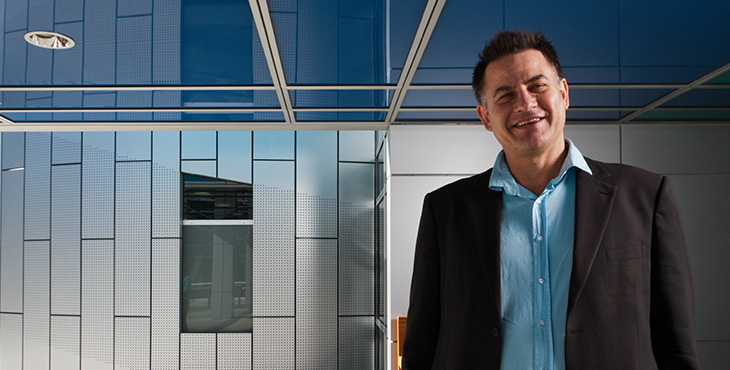
About Paul
Professor Paul Flatau commenced as the Chair in Social Investment and Impact and Director of the UWA Centre for Social Impact (CSI) at the UWA Business School in December 2010.
With over 70 publications in the fields of labour economics, the history of economic thought, the economics of social policy and housing and homelessness, Paul has made significant contributions to the analysis of social and economic outcomes, social impact and the effectiveness of related programs and interventions.
He is passionate about ending homelessness, global poverty and unemployment as well as supporting Indigenous people in achieving their goals.
Paul's mother and father were missionaries who met in China just before the 1949 victory of the Communist Party. They married years later in Malaya where their sons Andrew and Paul were raised.
When Paul was 10, the family moved to Sydney – a big culture shock for the boy who had grown up speaking Chinese and playing with village kids. It wasn't until he played league and union, and became a regular fellow-traveller of the rowdy crowd on the "Hill", that he felt he belonged in Australia.
Paul holds a PhD in Economics from Murdoch University, an MEc from UWA and a BEc from Sydney University.
Poverty and homelessness
My colleagues and I at the Centre for Social Impact conduct innovative research in the areas of social finance, social innovation, social entrepreneurship and the measurement of the economic and social impact of activities and programs.
The UWA CSI is part of a national initiative under the CSI banner with affiliate centres at the University of New South Wales, Melbourne University and Swinburne University. It works together with the corporate, government, philanthropic and not-for-profit sectors, in a collaborative effort to build community capacity and generate social impact.
Our research asks what are the most important social issues we need to address and how do we create the knowledge to meet those social issues. We then ask : “What is the innovation needed to make positive change?”
One of our research studies identified a significant lack of integration between support services. Consequently, at-risk people are handballed between different service providers and their problems are not addressed in a holistic, integrated fashion. The research has indicated that clients are after a higher degree of partnership between service providers and a reduction in overlap. Higher levels of service integration lead to higher impact for clients. Social innovation can develop creative support systems that will benefit those disadvantaged as a result of complex and long-term systemic issues.
Our investigation into homelessness has led to programs which provide incentives to landlords to rent, through a community housing provider and with government assistance, their properties to homeless people.
A new Housing First approach piloted by Mission Australia in NSW which we did research on helped Australia's homeless people transition into permanent housing.
An evaluation of Mission Australia's MISHA (Michael's Intensive Supported Housing Accord) Project, led by me and conducted by a multi-university research team, found the MISHA project increased the tenancy retention rate of clients, reduced social isolation, increased employment rates, and had the potential to become a cost-neutral government program.
Based on the Housing First model, the three-year MISHA Project prioritised the human right to permanent housing, while making additional welfare services available but not compulsory.
Between 2010 and 2013, the MISHA Project placed more than 70 Parramatta-based homeless men in permanent accommodation, with access to a case worker, psychologist, activities coordinator and additional community support services.
Measuring impact
There is scepticism about researching the economics of social policy interventions and the use of economic instruments to evaluate social outcomes. The kind of research undertaken by CSI, however, has the capacity to maximise the benefit of social policy interventions for the mutual benefit of all involved.
There’s a whole range of inadequacies and duplication in the way that governments and service providers measure outcomes. By looking at the nature of outcomes measurements, we are helping organisations make more informed decisions. The UWA CSI and Bankwest Foundation have partnered to produce a long-term series of research projects that will transform the way that social impact is assessed in the WA community sector. Through this research, it is hoped that a systematic approach to unravelling complex social issues and proposing creative, holistic and innovative ways of addressing them can be developed.
Outcomes of the research program will be delivered through a series of launch events and panel discussions, known as the Social Impact Series, and in community and policy workshops. The research program focuses on the key themes of ‘measuring outcomes in the community sector' and improving the financial resilience of social enterprises.
Whilst some are critical of the economic evaluation of social problems like poverty, uncovering the real true cost of these problems can promote and encourage action and bring change. Undertaking innovative steps to more effectively deliver services will not only have a direct impact on the poor, but will also help develop a more resilient, sustainable social system for Australia.
The Centre for Social Impact and UWA Business School are hosting a Mustard Seed pitch event on May 14. Entries are now closed but you're invited to come along and see all the finalists as they pitch for investment in the next big social enterprise idea. This is the first event in the UWA CSI 2015 Social Impact Festival featuring public lectures, workshops, and forums across campus. The Festival includes a lecture by UWA graduate Michael Sheldrick on Unlock Your Power: How your actions can change the world and examines the theme of building a movement of global citizens to end extreme poverty by 2030.